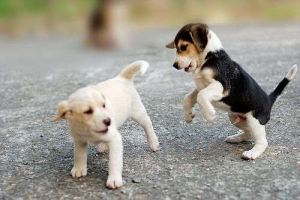Have you ever wondered how you can help a puppy to be a well-adjusted, comfortable, social and happy adult dog? If so, this article is for you. There are many factors that play a role in the development of a dog. Some, like genetics, are out of our control. Socialization on the other hand, is something we can positively impact. Keep reading to learn more!
Adopting or adding a puppy to your family is a rewarding and exciting adventure!
Aside from all of the kisses, snuggling and just plain sweetness that puppies offer, the most amazing part about adopting a puppy is your unique opportunity to help your puppy grow up to be the best dog that he or she can be.
According to veterinarian, animal behaviorist and dog trainer, Dr. Ian Dunbar, “The critical period of socialization is by three months of age. This is the development stage during which puppies learn to access and enjoy the company of other dogs and people.” During these first months of your puppy’s life, he is forming powerful associations about what is safe and dangerous in the world. During this time period, it is critically important that you expose your dog to people – especially strangers including men and children, noises, new environments, dogs and any other animals with whom you may want your dog to share his home.
Dr. Dunbar suggests that your puppy meet 100 new people by the time they are eight weeks old. Okay, I know what you are thinking: “We didn’t even bring our dog home until they were eight, ten or twelve weeks old; how could they have already met 100 people by this time?”
While the quantity of people, places and dogs that your dog meets does matter, what is MUCH more important is what type of experience they have when meeting the plumber for the first time or when visiting a new playground. To me, the most important thing about the first three months of your dog’s life is that it is loaded with POSITIVE experiences. What we are working to avoid are scary or negative experiences.
To accomplish this, it is important to use something that your dog loves, like a new and very tasty treat, (think chicken, cheese, hot dogs) or your dog’s favorite toy. When the plumber enters your home for the first time, have them toss Fluffy a few pieces of chicken and then go about their business. Hopefully, what Fluffy just learned is: when unfamiliar people with unfamiliar things enter my home, something great happens for me. Yippee!
You may also want to prepare your puppy for experiences in life that you know are likely to be unpleasant. For example, we all know that our puppy is going to have to visit the veterinarian from time to time. Being poked, prodded and examined is not always the most fun experience. To ensure that your puppy is comfortable visiting the veterinarian as an adult, visit your clinic several times a week when they are still a puppy, and have the sweet folks at the front counter offer Fluffy a few pieces of cheese before you leave. The hope is that by doing this, your puppy will have many more positive visits at the veterinary, than scary experiences.
Here are some things to consider exposing your puppy to: Children and adults of different ethnicities and sizes; polite, vaccinated adult dogs; puppies, puppies and more puppies; grass, wood and linoleum (shiny) flooring, stairs, sewer grates, elevators; common household sounds (pots and pans, vacuum), children screaming or crying, thunderstorms, fireworks and sirens; car rides and vet visits; helmets, hats, glasses and goggles; water, wind and camp fires.
For a more extensive list of socialization ideas created by Dr. Sophia Yin, please visit this link.
Please remember to do this gradually. If you see your pup pinning their ears, tucking their tail, running away, hiding or if they discontinue eating, please immediately stop what you are doing. Remember, the goal is that these experiences are positive.

